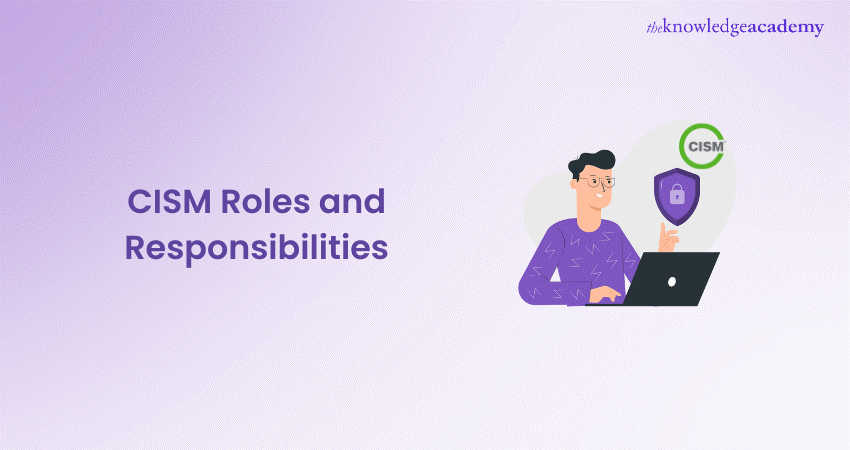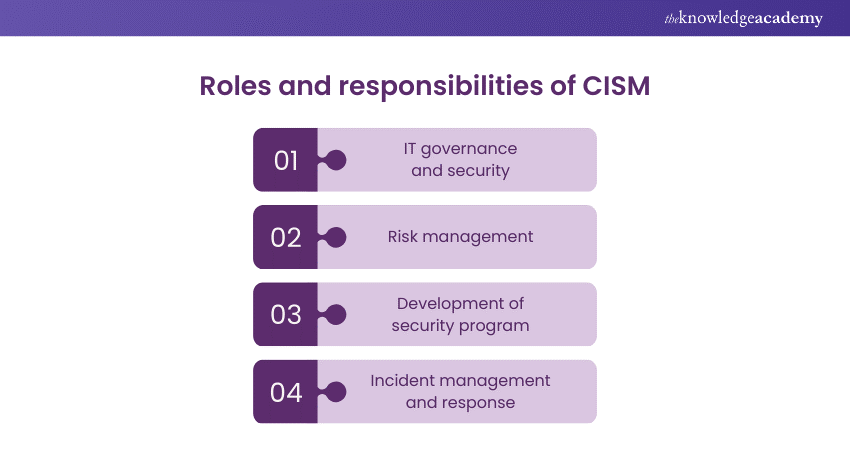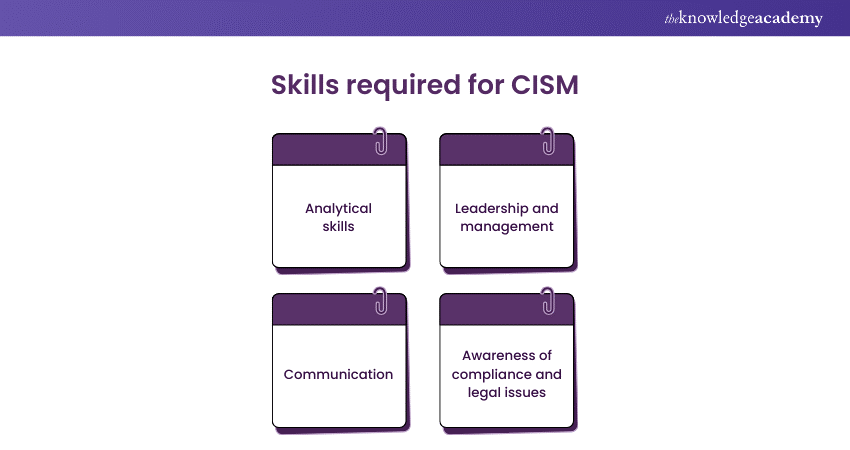We may not have the course you’re looking for. If you enquire or give us a call on +46 850282424 and speak to our training experts, we may still be able to help with your training requirements.
We ensure quality, budget-alignment, and timely delivery by our expert instructors.

If you’re contemplating a career in Information Security Management, the Certified Information Security Manager (CISM) Certification could be an important step in your professional journey. Understanding the CISM Roles and Responsibilities is essential for aspiring security managers. This esteemed certification is more than a credential; it’s a testament to your ability to govern, architect, and administer an organisation’s Information Security framework.
In this blog, we’ll explore the critical aspects of the CISM Certification. We’ll outline its scope, detail its principal roles, highlight the competencies required for success, and offer strategic advice to help you pass the CISM examination on your first attempt.
Table of Contents
1) What is CISM?
2) Roles and responsibilities of CISM
3) Skills required for CISM
4) CISM requirements
5) How do you pass the CISM exam on the first attempt?
6) Conclusion
What is CISM?
The Certified Information Security Manager (CISM) designation is a globally esteemed professional certification provided by ISACA that targets Information Security Managers. This certification validates a professional’s competence in architecting, deploying, and governing an information security program.
Renowned worldwide, the CISM credential stands as a hallmark of excellence for Information Security Managers. Professionals holding the CISM Certification are sought after in the job market, and obtaining this certification can catalyse career advancement and facilitate higher earning potential.
Roles and Responsibilities of CISM
CISMs play a pivotal role in shaping the security landscape of their organisations. Key CISM Roles and Responsibilities include:

a) IT governance and security: CISMs’s main objective is to adhere to the established best practices and regulations that outline the Information Security policies and guidelines.
b) Risk management: CISMs are responsible for identifying, assessing, and addressing Information Security risks to ensure they are within the organisation’s risk appetite.
c) Development of security program: CISM designs and implements Information Security strategies that align with organisational goals.
d) Incident management and response: CISM establishes protocols to address and mitigate security incidents effectively.
Get expert study tips with the CISM Certified Information Security Manager Study Guide—download now!
Skills required for CISM
Professionals aiming to earn the CISM Certification need to have technical proficiency and strategic awareness. Essential skills include:

a) Analytical skills: Knowing how to analyse high-threat security systems and their risk responses
b) Leadership and management: A strong need for the skills of managing and leading teams as well as assignments and initiatives that improve organisation’s security.
c) Communication: The ability of the Security Analyst to cover both technical and nontechnical aspects of the issues and to explain the security as well as risk implications to the stakeholders is crucial. Using a CISM Cheat Sheet can help them efficiently recall key concepts and ensure they are well-prepared to address concerns effectively.
d) Awareness of compliance and legal issues: Acquisition of knowledge in the key laws, policies, and regulations regarding Information Security.
Learn Cybersecurity management with our Chief Information Security Officer Training- register today!
CISM requirements
Candidates must fulfil these requirements to become a CISM.
a) Experience: The candidate needs to have a minimum of five years of work experience in Information Security Management.
b) Examination: Passing the CISM exam is necessary. The four domains of Information Security Management are:
1) Information Security Governance
2) Information Risk Management
3) Information Security Program Development and Management
4) Information Security Incident Management
c) Code of ethics: It is compulsory to meet the ISACA’s code of professional ethics.
Learn best practices to mitigate security risks and challenges with our Information Systems Security Management Training- join today!
How do you pass the CISM exam on the first attempt?
Passing the CISM exam requires preparation and a strategic approach. Here are some tips to help you pass the exam:
a) Understand the material: Thoroughly review the CISM Review Manual and other relevant texts from ISACA.
b) Practice exams: Regularly take practice exams to familiarise yourself with the format and type of questions asked.
c) Study groups: Join or form a study group to gain insights and perspectives from fellow CISM candidates.
d) Time management: Develop a study plan that covers all topics systematically, allowing ample time for review.
Prepare like a pro with CISM Books. Read now!
Conclusion
We hope this blog has provided you with a clear insight into the CISM Certification, encompassing the essential roles, competencies, and credentials required to achieve certification and excel in the dynamic realm of Information Security Management. Grasping the CISM Roles and Responsibilities is crucial for IT professionals aspiring to thrive in this field.
Improve skills in developing and implementing security policies with our CISM Certified Information Security Manager Course – join today!
Frequently Asked Questions
How long does it typically take to prepare for the CISM exam?

The preparation time for the CISM exam depends on the candidates. It takes around three to six months of studying. It is advisable to dedicate study time each week and use resources such as the CISM Review Manual and practice exams.
Can I still pursue CISM Certification if I don’t have five years of Information Security Management experience?

Yes, you can take the CISM exam without having the full five years of experience. However, you will need to get the necessary experience within ten years after passing the exam to receive the certification.
What are the other resources and offers provided by The Knowledge Academy?

The Knowledge Academy takes global learning to new heights, offering over 3,000 online courses across 490+ locations in 190+ countries. This expansive reach ensures accessibility and convenience for learners worldwide.
Alongside our diverse Online Course Catalogue, encompassing 19 major categories, we go the extra mile by providing a plethora of free educational Online Resources like News updates, Blogs, videos, webinars, and interview questions. Tailoring learning experiences further, professionals can maximise value with customisable Course Bundles of TKA.
What is the Knowledge Pass, and how does it work?

The Knowledge Academy’s Knowledge Pass, a prepaid voucher, adds another layer of flexibility, allowing course bookings over a 12-month period. Join us on a journey where education knows no bounds.
What are the related courses and blogs provided by The Knowledge Academy?

The Knowledge Academy offers various CISM Course, including Certified Information Security Manager (CISM) Training Course, Certified Data Protection Officer (CDPO) Course and Certified in Risk and Information Systems Control (CRISC) Course. These courses cater to different skill levels, providing comprehensive insights into CISM or CRISC: A Complete Comparision.
Our IT Security & Data Protection Blogs cover a range of topics offering valuable resources, best practices, and industry insights. Whether you are a beginner or looking to advance your Information Security Manager (CISM) skills, The Knowledge Academy's diverse courses and informative blogs have you covered.
Upcoming IT Security & Data Protection Resources Batches & Dates
Date
 CISM Certified Information Security Manager
CISM Certified Information Security Manager
Mon 3rd Mar 2025
Sat 8th Mar 2025, Sun 9th Mar 2025
Sat 5th Apr 2025, Sun 6th Apr 2025
Mon 14th Apr 2025
Sat 3rd May 2025, Sun 4th May 2025
Tue 6th May 2025
Mon 2nd Jun 2025
Sat 7th Jun 2025, Sun 8th Jun 2025
Sat 5th Jul 2025, Sun 6th Jul 2025
Mon 7th Jul 2025
Sat 2nd Aug 2025, Sun 3rd Aug 2025
Mon 4th Aug 2025
Mon 1st Sep 2025
Sat 6th Sep 2025, Sun 7th Sep 2025
Sat 4th Oct 2025, Sun 5th Oct 2025
Mon 6th Oct 2025
Mon 3rd Nov 2025
Sat 8th Nov 2025, Sun 9th Nov 2025
Mon 1st Dec 2025
Sat 6th Dec 2025, Sun 7th Dec 2025






 Top Rated Course
Top Rated Course



 If you wish to make any changes to your course, please
If you wish to make any changes to your course, please


